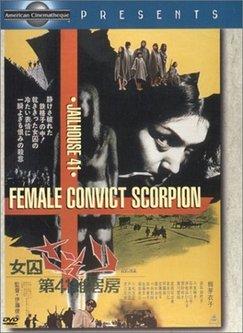To a connoisseur of b-movies, the women-in-prison movie has always held a certain attraction. Almost always filmed with an eye towards exploitation, these movies feature every kind of prurient impulse a (mostly male) exploitation audience brings with it. The generic hallmarks of the women-in-prison are sadistic wardens, lesbian dalliances, sadistic beatings (highly eroticized, at that--this is the genre for the S&M crowd), and loads of naked women. The classic women-in-prison movie is Caged Heat, one of Jonathan Demme's first films. But even that movie aspired only to titillation. Not that there's anything wrong with that, mind you (well, if you have a feminist point of view, maybe there is...), but these movies almost never rise to the artistic ambition of their masculine counterparts. The men-in-prison movie has produced a whole slate of artistic triumphs, from Jules Dassin's Brute Force to The Shawshank Redemption, but not so the women-in-prison movie.
Which brings me, in a roundabout way, to today's movie: Female Convict Scorpion: Jailhouse 41 may well be an artistic triumph of a sort not usually found in the women-in-prison movie. This is NOT because it somehow abandons the exploitation thrills found in the genre. Quite the contrary. The movie sinks deeper into those thrills than most such film, offering lurid spectacle aplenty. Every lurid impulse is there for the exploitation audience. But the film itself aspires to a good deal more than that.
Female Convict Scorpion: Jailhouse 41 is the second film in a series. In the first film--a film that shares its artistic ambitions with the second, our heroine, Matsu, is wrongly incarcerated at the whim of her faithless criminal lover. She escapes and exacts her vengeance, though not before making a deadly enemy of the prison's warden. The warden is blinded during a fight between Matsu and another prisoner and he blames her. In the second film, we pick up where we left off. Matsu has been captured and the warden is intent on "breaking" her. Soon enough, Matsu and her chain gang make their escape and the rest of the movie follows them as they try to evade the law.
But that's all plot. That doesn't even hint at how delirously weird this movie is. Although the series is based on manga, in terms of its style, this movie has more in common with Japanese theatrical traditions than any other influence. The closest film to this one in terms of its style is Masaki Kobayashi's elegant horror movie, Kwaidan. Female Convict Scorpion: Jailhouse 41 is the women-in-prison movie as Noh theater. As pure abstraction, this film is a stunner. You simply cannot take your eyes off of it.
The movie is anchored by Japanese exploitation diva, Meiko Kaji, who is a formidable presence. I don't believe that she says a word until the movie is two-thirds over, and when she does, it's a stunning turn of events. Until that point, her lacerating glare and silent fury are palpable throughout. Kaji is best known for her performance in Lady Snowblood , one of the source texts for Kill Bill, but she's better here. As in the first film, Matsu becomes an angel of vengeance in the last part of the movie, but unlike that film, she becomes abstracted into a principle, too. The transformation is thrilling to watch.
Both the first and second films in this series are available in the United States (I found the first film at my local Best Buy). I hope the third film makes it to these shores, too--these are an experience like no other, after all. By all means, track these down in the interim. For those Kill Bill scholars, the song "Urami Bushi" by Meiko Kaji in Volume 2 comes from these movies.

12/2/05